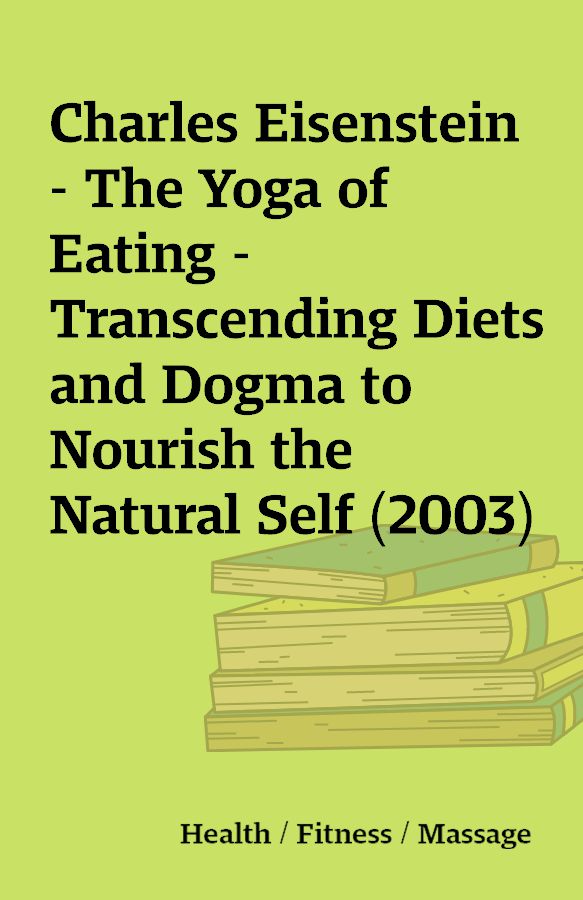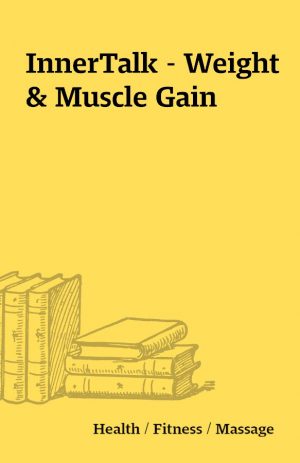Charles Eisenstein – The Yoga of Eating – Transcending Diets and Dogma to Nourish the Natural Self (2003)
Charles Eisenstein – The Yoga of Eating – Transcending Diets and Dogma to Nourish the Natural Self (2003)
[1 Scan – 176 JPG]
Description
http://www.amazon.com/Yoga-Eating-Transcending-Nourish-Natural/dp/0967089727/Product DescriptionThe Yoga of Eating is a practical and inspiring manual that offers original insights on the physical and spiritual functions of sugar, fat, meat, and other foods; fasting, dieting, processing, willpower, and the deeper principles of self-nurture. This book appeals to a higher authority–your own body–and shows how to access and trust the wisdom your body has to offer.Product Details Paperback: 192 pages Publisher: Newtrends Publishing, Inc.; 2 Revised edition (August 2003) Language: English ISBN-10: 0967089727 ISBN-13: 978-09670897205.0 out of 5 stars Yoga of Eating a Must Read for Health Seekers, April 5, 2004By Chet Day (Shelby, NC USA)Since 1993 I’ve read so many books on diet and nutrition I could literally fill a large garage with them.In fact, if I hadn’t donated most of the health books I’ve read over the years to Goodwill, the CasaDay garage would be filled to the rafters, and my wife wouldn’t have any space left to store even more junk that we continue to accumulate as we march through our 33rd year of matrimonial bliss.Well, today I want to write a few words about a book on diet that won’t be headed for t garage or the Goodwill discount shelves, a book that has gained instead a permanent place in my natural health library: “The Yoga of Eating” by Charles Eisenstein.And, no, you don’t have to twist your body into weird-looking contortions to enjoy Eisenstein’s book.All you have to do is sit back, open your mind, and settle in for what I predict will be one of the most pleasant and enlightening reads about living and eating that you’ve ever enjoyed.Subtitled “Transcending Diets and Dogma to Nourish the Natural Self,” Eisenstein’s book teaches you how to listen to your body and how to interpret the constant signals it’s sending you on what to eat and how to live.Most of us – stumbling our way through a world that’s paced too fast and full of too many distractions — never shut up or slow down long enough to even hear (much less pick up on and interpret) the messages our bodies send out every moment of our lives.Messages that can make us happy, keep us slim, and guarantee us long, healthy, and useful lives.To give you a better sense of Eisenstein’s insights, here are a few key passages that I highlighted in my copy of “The Yoga of Eating”:Often the information we get from our bodies contradicts received beliefs about what is and isn’t healthy, virtuous or right. Then our trust is put to the test. But the body is wise, and the rewards for trusting it great.The body will first be attracted to foods that meet its most urgent needs. A starving body will hunger for anything, even rotting meat, to meet the raw need for calories. As the grosser needs are fulfilled, subtler appetites and aversions come to the fore. In my late 20’s, after a prolonged period of near-veganism combined with a profound lack of inner nurturance, my body hungered deeply for animal foods, a hunger which at first I ashamed denied. When I finally let myself eat meat I was suffused by intense waves of pleasure and well-being. Eventually, when I caught up with my body’s pent-up need for animal protein and, especially, animal fat, I discovered that sometimes meat, particularly conventionally-raised chicken, had a certain stink to it; when I paid attention, it didn’t taste so good after all.When you listen to your body, it will guide you toward the diet that is right for you.Pretty good stuff, eh? Here’s more, this time tackling cravings and will power…If it is a true, body-based appetite, then every time you deny it, it gets stronger. If it is a superficial craving, not serving a genuine need, then every time you resist it, it gets weaker. The same applies outside the arena of food. If your soul is calling for something, and you deny it, the call will wax in volume until life becomes unbearable. But if you resist a habit that distracts you from a joyful, creative purpose, its compulsion will diminish. The first time is always the hardest (but it may never be easy).In communicating with the body, allow yourself to totally trust the results. Vow that you will accept your body’s answer. Don’t attempt to use this technique as a way of quelling or fighting the craving. Let go of any expectation that you will eat less or differently. We got where we are by not listening to and trusting the body. Any fundamental reversal of this state of affairs demands far greater courage than to simply apply willpower. Willpower is a very small thing, really. It involves no risk, for it comes from who we already are. Surrendering, trusting, allowing change to happen without a program: that is something much greater.Eisenstein has quality chapters on the following topics:Food and PersonalityThe karma of FoodThe Natural BreathMaking It PracticalDiscovering the Right DietLoving the Body, Loving the SelfThe Yoga of CookingRelaxing into Change… and a whole lot more.You can add all 175-pages of “The Yoga of Eating” to your library for under $12 at amazon.com, a tremendous buy for one of the best books on health, diet, nutrition, and living a satisfying life that I’ve ever read. Please contribute back by OCRing *and* Spellchecking/Proofreading (!) this book. I recommend ABBYY Finereader 10 (or 11) for doing this work in a relatively easy way. There are other applications as well. The important thing is to spellcheck and correct any mistakes the automatic software run did – often people just run automatic conversion and upload here a pdf that has many mistakes and/or can’t be converted to other digital formats.If you start to do the process please leave a comment here so the effort won’t be duplicated by others. Thank you.
You must be logged in to post a review.






Reviews
There are no reviews yet.